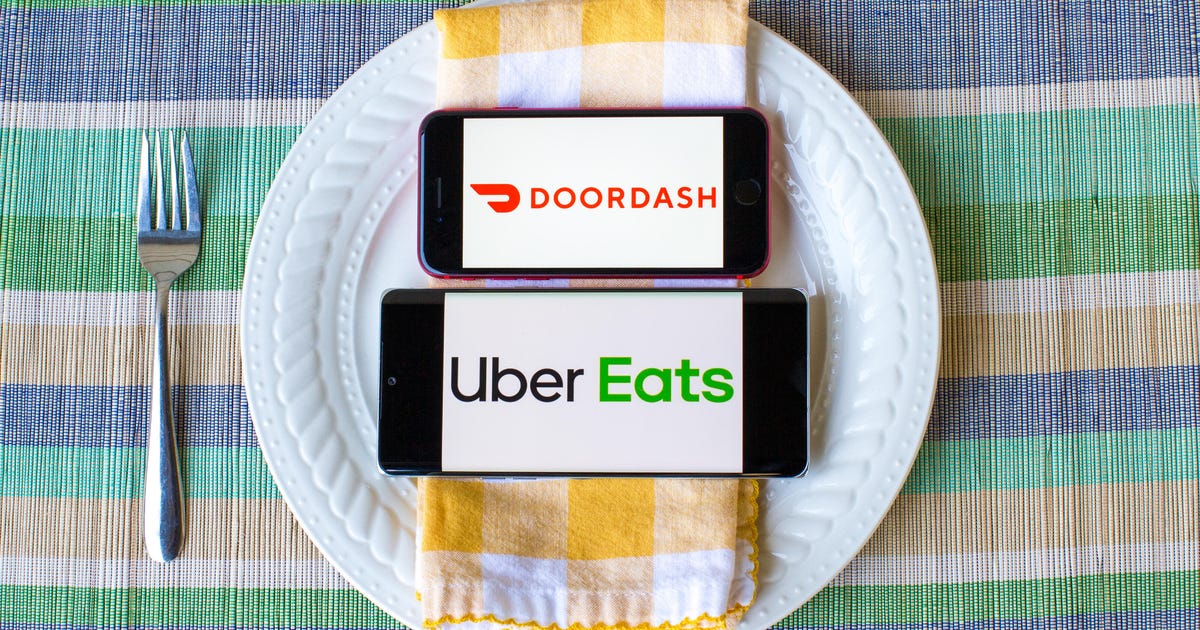get these nets
Veteran
Delivery apps can no longer waive fees for Black-owned restaurants in Arizona. Here's why

June 7, 2021
Arizona Attorney General Mark Brnovich announced June 2 that Uber Eats, Postmates and DoorDash can no longer ditch delivery fees for Black-owned restaurants based on race, claiming it discriminates against non-Black-owned restaurants.
In June 2020, Uber Eats and Postmates, which is owned by Uber, announced they were waiving delivery fees from Black-owned restaurants in the United States and Canada. DoorDash followed suit, and the companies created a category on their apps' landing pages featuring Black-owned restaurants, so customers could more easily find them.
DoorDash noted on its blog it saw an increase in searches for Black-owned businesses in June 2020 compared to the month prior.
The promotions came after March 25, 2020, when a Minneapolis police officer murdered George Floyd, a 46-year-old Black man, by kneeling on his neck. Floyd's murder catalyzed worldwide protests to demand police accountability and justice for Black lives.
In Fall 2020, the Civil Rights Division of the Arizona Attorney General's Office opened a case against the food delivery companies for alleged discrimination.
“Even with the best of intentions, corporations can do the wrong thing. Altering the price of goods or services based on race is illegal,” said Attorney General Mark Brnovich in a press release.

“My office opened these investigations and pursued these settlements to protect civil rights and ensure businesses offer their services and products based on equal and neutral criteria.”
The complaints were not limited to Arizona. Uber said it received more than 8,500 demands for arbitration after it waived delivery fees for Black restaurant owners, TechCrunch reported in October 2020.
The Attorney General's Office settled the cases in May 2021, with two separate settlement agreements for Uber and Postmates, and DoorDash, according to copies of the agreements provided by the agency.
https://www.azcentral.com/story/ent...stro-bar-phoenix-building-history/3671746001/
The companies agreed to not offer financial incentives to clients in Arizona based on the restaurant owner's race or other identifiers that include sex and religion.
DoorDash denies any wrongdoing, "particularly when government programs have offered the exact support DoorDash has provided," company spokesperson Taylor Bennett wrote in an email.
The company, however, is ready to move past this dispute, she wrote.
"Furthering the long tradition of public and private sector efforts to break down barriers, DoorDash is proud to support Black-owned businesses and honored to do our part to lift up those who need it most," Bennett said.
Meghan Casserly, a spokesperson for Uber Eats and Postmates, also commented on the promotion, which the companies ran June through December 2020.
"We’re proud to have supported Black-owned businesses and we'll continue to make it a priority. We have heard loud and clear from consumers that the ability to easily identify Black-owned restaurants on Uber Eats is a feature they want and appreciate," Casserly wrote in an ememail.
What does this mean for Black-owned businesses?
The Black Lives Matter movement spurred activists last year to share their favorite Black-owned businesses on social media, and support Black restaurant owners who were grappling with both the public health crisis and business closures.
A USA Today investigation explored how racist policies of the past and present have fueled high COVID-19 deaths in communities of color.
In April 2020, the number of active Black-owned businesses dropped by 41% compared to a decline of 17% for white-owned businesses, according to an analysis from the University of California, Santa Cruz. Numerous other analyses show the racial disparity in accessing federal relief funds, with businesses in majority-white communities receiving Paycheck Protection Program loans at higher rates.
Third-party delivery services became a go-to source for many restaurateurs hoping to make up on some of their lost revenue. But when delivery companies charged restaurants commission of up to 30% on every order, some metro Phoenix restaurateurs expressed frustration.
In July 2020, as part of its equity campaign for Black-owned restaurants, DoorDash allowed independent Black-owned restaurants to sign up for free and pay zero commissions for 30 days through the end of the year.
"We all have an obligation to elevate and support underrepresented communities, and we look forward to continuing to do so in Arizona and beyond," DoorDash spokesperson Taylor Bennett said.

June 7, 2021
Arizona Attorney General Mark Brnovich announced June 2 that Uber Eats, Postmates and DoorDash can no longer ditch delivery fees for Black-owned restaurants based on race, claiming it discriminates against non-Black-owned restaurants.
In June 2020, Uber Eats and Postmates, which is owned by Uber, announced they were waiving delivery fees from Black-owned restaurants in the United States and Canada. DoorDash followed suit, and the companies created a category on their apps' landing pages featuring Black-owned restaurants, so customers could more easily find them.
DoorDash noted on its blog it saw an increase in searches for Black-owned businesses in June 2020 compared to the month prior.
The promotions came after March 25, 2020, when a Minneapolis police officer murdered George Floyd, a 46-year-old Black man, by kneeling on his neck. Floyd's murder catalyzed worldwide protests to demand police accountability and justice for Black lives.
In Fall 2020, the Civil Rights Division of the Arizona Attorney General's Office opened a case against the food delivery companies for alleged discrimination.
“Even with the best of intentions, corporations can do the wrong thing. Altering the price of goods or services based on race is illegal,” said Attorney General Mark Brnovich in a press release.

“My office opened these investigations and pursued these settlements to protect civil rights and ensure businesses offer their services and products based on equal and neutral criteria.”
The complaints were not limited to Arizona. Uber said it received more than 8,500 demands for arbitration after it waived delivery fees for Black restaurant owners, TechCrunch reported in October 2020.
The Attorney General's Office settled the cases in May 2021, with two separate settlement agreements for Uber and Postmates, and DoorDash, according to copies of the agreements provided by the agency.
https://www.azcentral.com/story/ent...stro-bar-phoenix-building-history/3671746001/
The companies agreed to not offer financial incentives to clients in Arizona based on the restaurant owner's race or other identifiers that include sex and religion.
DoorDash denies any wrongdoing, "particularly when government programs have offered the exact support DoorDash has provided," company spokesperson Taylor Bennett wrote in an email.
The company, however, is ready to move past this dispute, she wrote.
"Furthering the long tradition of public and private sector efforts to break down barriers, DoorDash is proud to support Black-owned businesses and honored to do our part to lift up those who need it most," Bennett said.
Meghan Casserly, a spokesperson for Uber Eats and Postmates, also commented on the promotion, which the companies ran June through December 2020.
"We’re proud to have supported Black-owned businesses and we'll continue to make it a priority. We have heard loud and clear from consumers that the ability to easily identify Black-owned restaurants on Uber Eats is a feature they want and appreciate," Casserly wrote in an ememail.
What does this mean for Black-owned businesses?
The Black Lives Matter movement spurred activists last year to share their favorite Black-owned businesses on social media, and support Black restaurant owners who were grappling with both the public health crisis and business closures.
A USA Today investigation explored how racist policies of the past and present have fueled high COVID-19 deaths in communities of color.
In April 2020, the number of active Black-owned businesses dropped by 41% compared to a decline of 17% for white-owned businesses, according to an analysis from the University of California, Santa Cruz. Numerous other analyses show the racial disparity in accessing federal relief funds, with businesses in majority-white communities receiving Paycheck Protection Program loans at higher rates.
Third-party delivery services became a go-to source for many restaurateurs hoping to make up on some of their lost revenue. But when delivery companies charged restaurants commission of up to 30% on every order, some metro Phoenix restaurateurs expressed frustration.
In July 2020, as part of its equity campaign for Black-owned restaurants, DoorDash allowed independent Black-owned restaurants to sign up for free and pay zero commissions for 30 days through the end of the year.
"We all have an obligation to elevate and support underrepresented communities, and we look forward to continuing to do so in Arizona and beyond," DoorDash spokesperson Taylor Bennett said.





